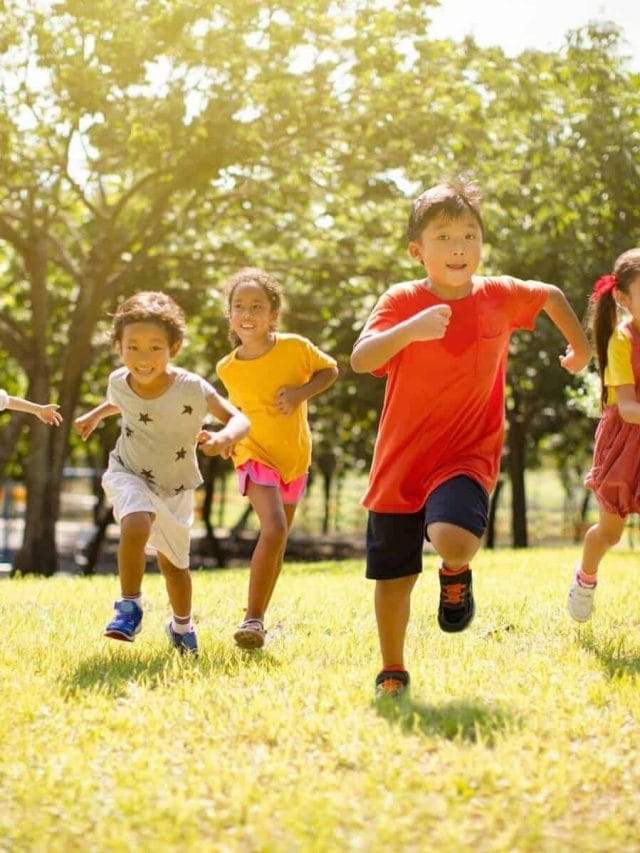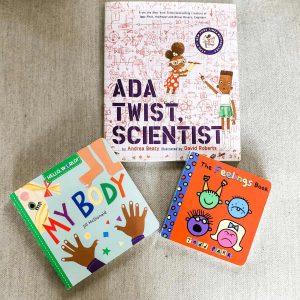Let’s talk about free play. As children start preschool earlier and earlier and play becomes less of a priority, we see the backlash.
Many parents are worried their children aren’t getting enough free play, while others are pushing play-based learning, particularly for toddlers and preschool children.
These are great aims, as play is essential to learning–in fact, it’s time we recognize that play is learning.
But to ensure our kids are getting the kind of play they need, we need to understand this term that has become so common and understand the common question: what is free play?
We’ve done the work for in terms of helping you understand the definition, benefits of, and how you can incorporate FREE PLAY!
Okay, now let’s get to playing…

This site contains affiliate links, meaning that we earn a small commission for purchases made through our site. We only recommend products we personally use, love, or have thoroughly vetted.
Free Play as a Pastime
When you think about play during your own childhood (assuming it was one of relative peace), what do you think about?
Were you one of those “free range” children whose mother simply said, “be back by five” on weekends and during the summertime? Or who knew that your butt better be home the second she called you for dinner?
Were you like me, and your mom locked you outside during the summer with a pitcher of Kool-aid and told you to find something to do?
(And if your childhood was like mine, that pitcher had 2 full cups of sugar in it. My, how things have changed.)
My own childhood was one full of adventure, and my siblings and I did things that today would likely get the department of child and family services involved.
So what’s the impact of these changes?
The Effects of the Loss of Childhood Play
In today’s world, the growing pressure for families to prioritize academics over play has many of us wondering what happened to the playtime that was so abundant in our own childhoods.
We’ll leave it to American Academy of Pediatrics to explain why play is so important:
Play is essential to development because it contributes to the cognitive, physical, social, and emotional well-being of children and youth. Play also offers an ideal opportunity for parents to engage fully with their children.
We must find balance. In a world that prioritizes academic achievement as early as preschool, our children can’t get along being all about play all the time. But they’re clearly missing it.
Just look at the statistics. Chronic stress, depression, and suicide rates are on the rise among teenagers and college students.
They grow for just over a decade and turn into teenagers. These teenagers, who were our toddlers and preschoolers just a second ago, are experiencing higher levels of stress and depression than ever before.
So how can we intervene early?
What are the Benefits of Free Play for Kids?
The good news is that we can intervene by simply allowing our children to play freely! We’ll talk about how to encourage free play (and what, exactly, it IS) in a bit, but we also want to focus on why it’s so dang important.
When most of us think of playing we don’t necessarily think of its benefits. We tend to prioritize the benefits of things like academic tutoring or structured sports…but not PLAY.
According to the Harvard Graduate School of Education, though, it’s possible to “play with a purpose.” And that purpose is learning!
The benefit of play is that children are more relaxed while playing instead of sitting still and listening intently (while that does have a purpose, too).
This relaxation leads to a greater sense of self-imposed curiosity, i.e. someone is not making them learn; rather, they are figuring it out themselves.
The benefits are that your child will relax and enjoy the process of cognitive development through play, rather than structured lessons.

Free Play and Development
There are four areas of development that will grow as your child plays freely regularly. These include:
- Intellectual: Play builds a host of cognitive benefits for your child, like content knowledge, creative thinking, and problem-solving skills.
- Social: Playing with other children builds tons of great social skills, such as listening, empathy, and expressing feelings.
- Emotional: Children learn how to self-regulate feelings of anger, anticipation, and frustration as they play. It also helps them learn to set and change rules and boundaries.
- Physical: Children play physically, which benefits their little bodies tremendously. They also learn to push their own limits and what their bodies are capable of, which can instill confidence.
What Happened to Prioritized Free Play?
If play is so important to child development, what happened to it? The American Academy of Pediatrics notes several factors that have contributed to the decline in play.
We’ve distilled them down for you:
- A more hurried lifestyle: we often shuffle children from activity to activity, all while balancing our own busy schedules and the demands of modern parenting and life
- Changes in family structure: there are now more families with a single working head of household or two parents working full-time
- An increased attention to academics and enrichment activities at the expense of recess or free child-centered play: this is due to rigorous college admissions practices, more focus on reading and math in recent years, and the increasing rate with which we use and prioritize technology
Of course children must adjust to our current-day society, just as we must adjust to it.
But the importance of play amidst a busy schedule and parental desire for success for children must be balanced with play.
What Is Free Play?
It is important to note that when we say “play,” we mean child-directed FREE play.
Play should be relatively unstructured (depending on the child’s age) and should be led by the child. This doesn’t mean that you can’t join in (you should if you have time!); it simply means that you should follow your child’s lead.
This is especially hard for those control freak parents (Katy’s comment–because she knows she has control issues, and she says she constantly has to stop herself from redirecting Jack’s play to something she thinks would benefit him more).
We do not mean taking your child to the local gym for gymnastics, or packing them off to a summer STEM (Science, Technology, Engineering, Math) camp where they will learn how to build an Edison bulb.
Those things are super cool, but free play should be without direction and free.
We aren’t saying that you should open the back door and let your three-year-old roam around like a goat. Play should be more supervised for younger children (of course!), and as children age and become more responsible, play can be more open and less directed.
Incorporating Free Play Into Daily Life
Not sure how to initiate free play when your child is always hanging onto your t-shirt and begging you to hand over your iPhone or turn on CocoMelon for them?
Here are some ideas for free play during the early years. These are perfect ways to let your child’s imagination run wild without spending a lot of effort or money!
Toddlers (1-3 years)
Research suggests that active play is much better for your child’s cognitive growth than passive play.
Passive play includes watching TV or watching YouTube videos on a tablet. We know, we know…that’s how you get the dishes done. And laundry. And maybe even relax a little. We do it too. No judgment here, mama!
Our point is simply that should be one form of play, not the form of play.
Active play requires imagination, while passive play needs limited imagination.
Active play also involves physical activity, which supports development and proper physical growth! It also helps your toddler develop healthy habits that will last a lifetime. Experts suggest at least 30 minutes of unstructured play time, especially outdoors, for toddlers.
Free play is also an amazing way to promote toddler independence, which we all need a little more of in our lives.
Toys to Facilitate Toddler Free Play
In Katy’s recent post about toys for toddlers, she mentions several toys that can be great active play resources for your child:
- A water table
- Building blocks
- Etc.
Find a shady spot to set up a water table, or blow up an outdoor pool (we like this one because it has a built-in shade) and throw in some stacking cups. Get in the pool with your child and pretend to be fish! The ocean is the limit with unstructured play.
Need cold weather or rainy day ideas?
How about some non-toxic play doh? Grab a rolling pin from your kid’s kitchen set. Then snag some kid-friendly cookie cutters, and you’re set to play for hours.
And the recommendation is only half an hour!!!
See, you’re already rocking this free play thing!

Preschoolers (3-5 years)
In addition to active, imaginative play, preschoolers respond well to three types of play:
1.Play that involves body control: think balancing, moving the arms and legs to music, etc. Tell Alexa to play some music, and let your child stage a play or a musical! (Bonus: you can even tell them that you will be back in a little bit to watch the show, thus giving yourself a tiny bit of kid-free time).
Want toys in your home that help develop these skills? Think of a balance bike for young preschoolers and work your way up from there.
2. Play that involves locomotor skills: think crawling, walking, skipping, or running. Locomotor skills are great playgroup activities. Meet up with some other moms and preschoolers at the park or the local pool and watch the kiddos run, skip, or swim. Your work here is done.
Want toys in your home that help develop these skills? How about a jump rope? Or hula hoop?
3. Play that involves sending and receiving skills: think throwing and catching a ball, kicking, hitting, rolling. You know those giant bins of balls at Target and Walmart? Let your child pick one as a reward for good behavior, and you’ve suddenly got an afternoon of kicking the ball around the backyard, or a game of keepaway if you feel like following your child’s lead.
Why Play?
Our main source of research in this article has been the American Academy of Pediatrics. In the article, “The Importance of Play in Promoting Healthy Child Development and Maintaining Strong Parent-Child Bonds,” Kenneth R. Ginsburg advocates for play as a way to strengthen the bond between the parent and child:
Play also offers an ideal opportunity for parents to engage fully with their children
Kenneth R. Ginsburg
I’m sure I’m not the only one who looks at pictures of children on social media and wonders where the hell time went.
It seems like birth announcements go to graduation invitations in the blink of an eye. I’m not trying to get you all teary-eyed here; I’m simply trying to remind you to slow down.
Go outside and catch fireflies with your four-year-old. Play tea with your little one. Make a mudpie with your rambunctious little and leave it to Tide can get the mess out of his romper.
Keep it as simple as possible, but be sure to follow your child’s lead. Put down the phone and make some simple memories.
At the end of the day, free and unstructured play with your little one helps not only their cognitive and developmental growth, but it also strengthens your bond with them.
Tell us in the comments what your favorite kind of free play for kids is. Let’s share ideas!
Other Parenting Articles
- Montessori toys for 1 year olds
- Educational gifts for 2 year olds
- Educational TV shows for kids
- Movies good for toddlers
- Emotional development in toddlers
- Educational gifts for 4 year olds
- Sensory activities for babies
- Educational shows for toddlers
- Preschool activities at home
- What is free play
- Educational apps for kids













2 thoughts on “What Is Free Play, And Why Is It Essential For My Child?”